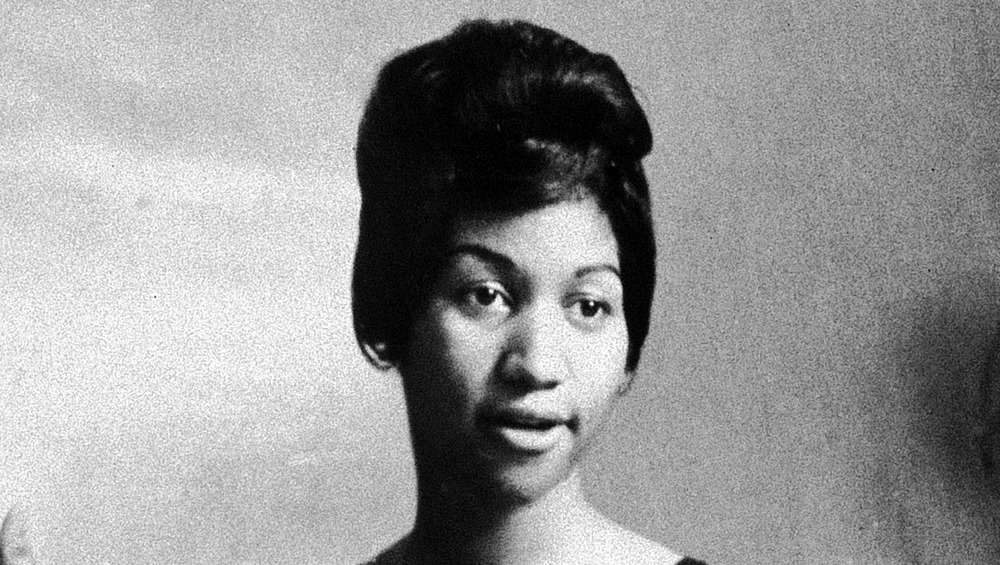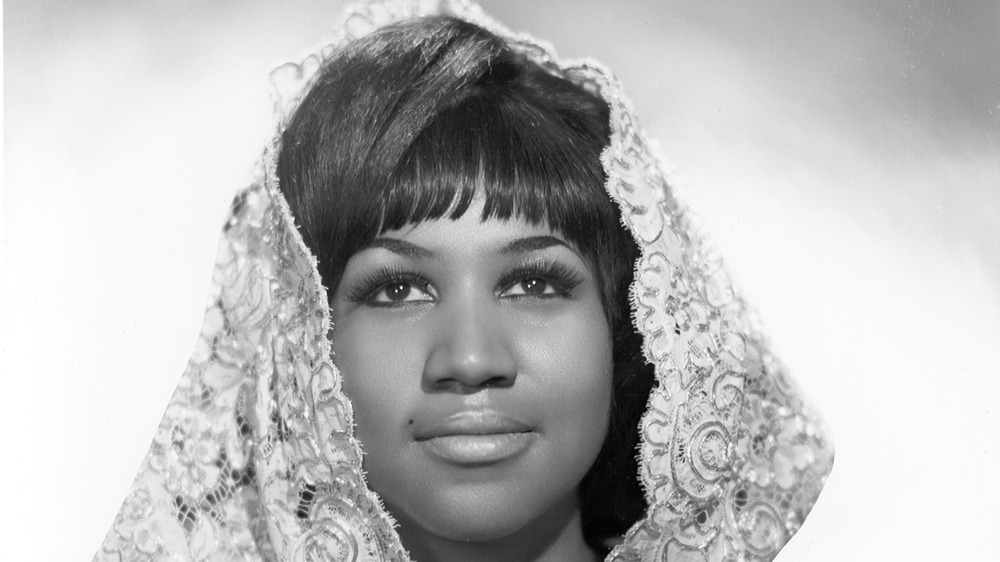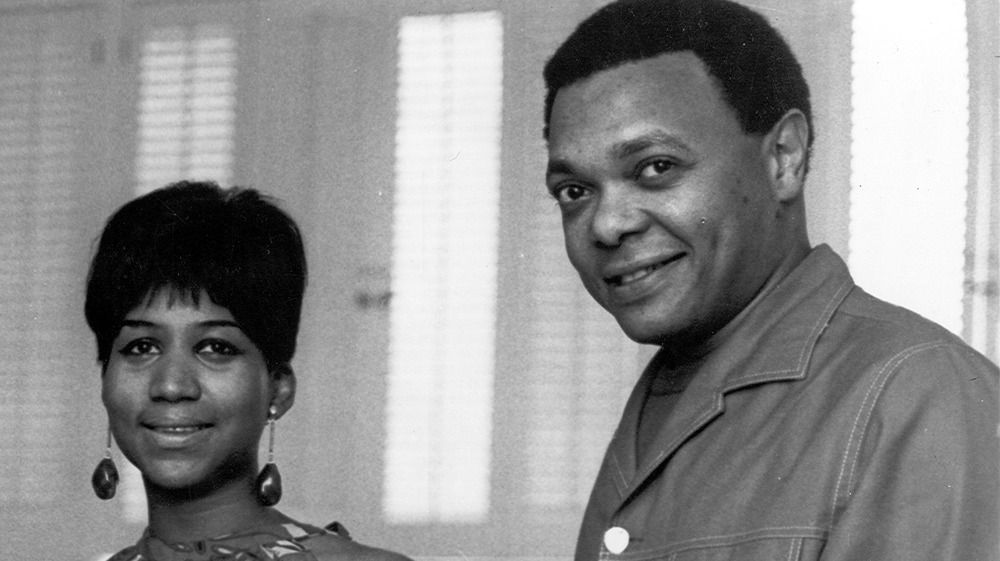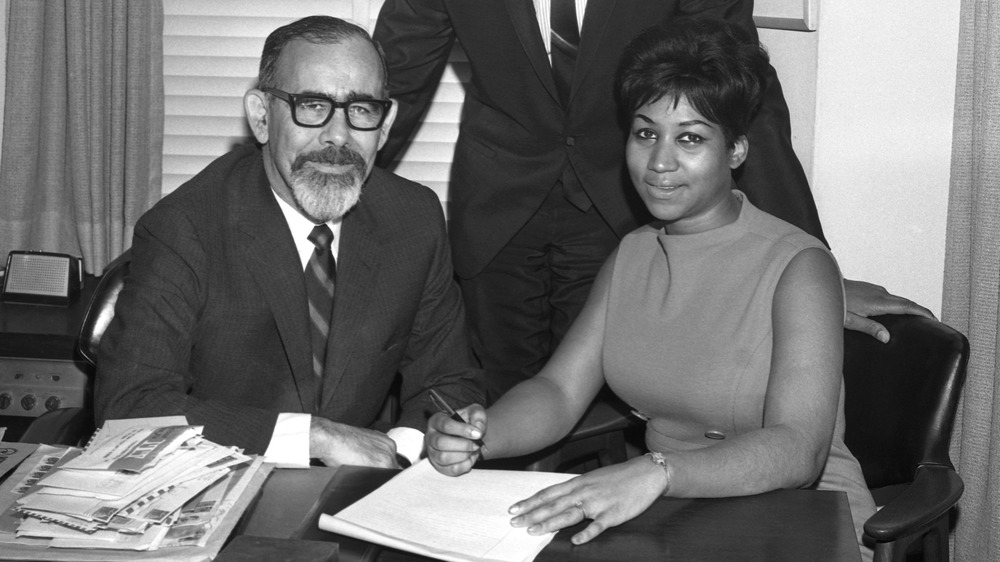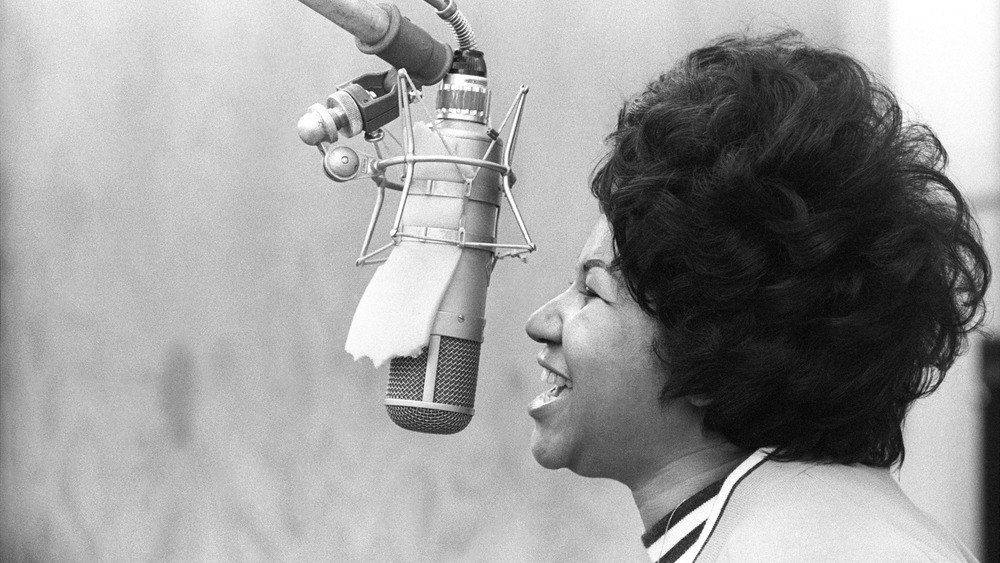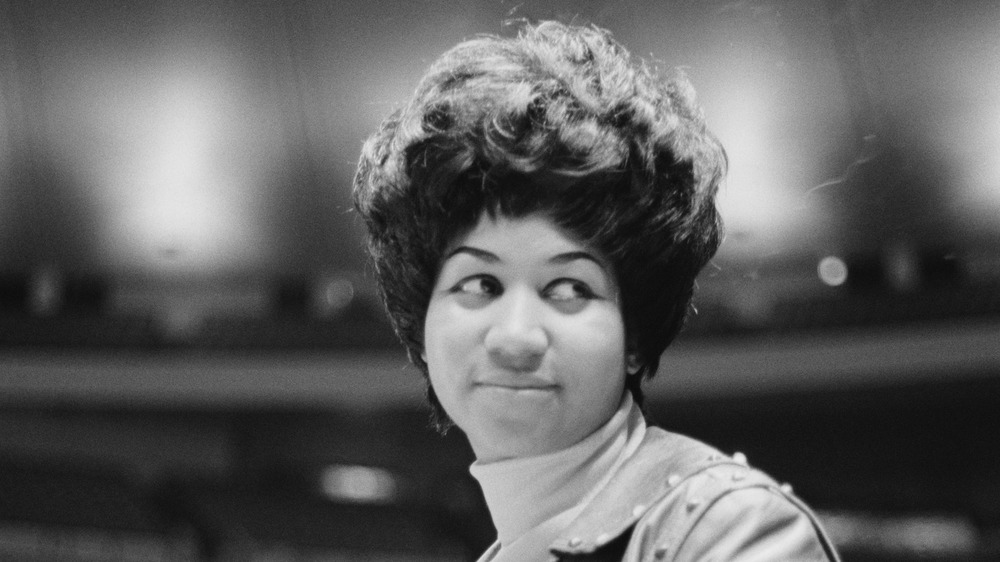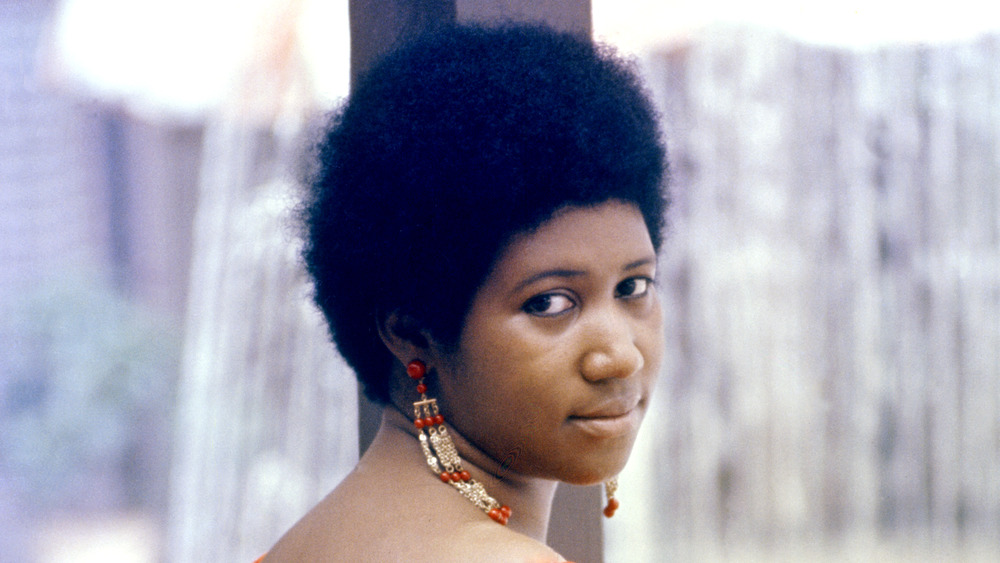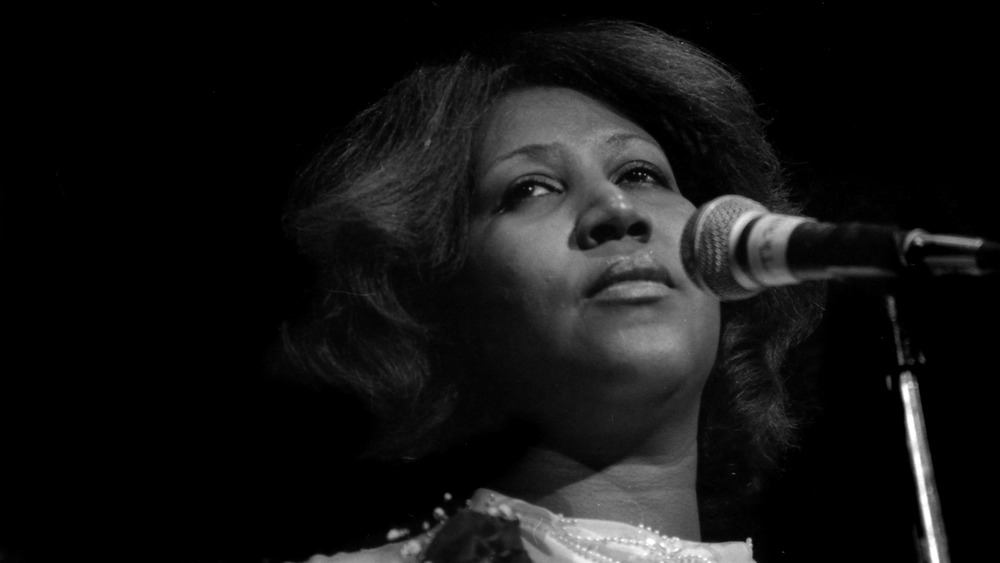The Heartbreaking True Story About Aretha Franklin
Without a doubt, Aretha Franklin was the Queen of Soul. And even though the soul of her music was often attributed to heartbreak and pain, there's an immense amount of freedom and perseverance in her music. Her rendition of Otis Redding's "Respect" is the finest example of this, as she transformed the song from a joyful request to an exuberant insistence.
Franklin's talents knew few limits, and during her peak her vocal range spanned four octaves, says Vox. With her music, Franklin became the voice of the Civil Rights Era and never hesitated to show up for people in her community, even singing at Martin Luther King, Jr.'s, funeral. Rev. Jesse Jackson called her "an inspiration, not just an entertainer."
Many of her friends and family remember her as being unstoppable in her final years, reports Rolling Stone, despite her declining health. And no matter what the world threw at her, Aretha Franklin did Aretha Franklin and never apologized for it. This is the heartbreaking true story about Aretha Franklin.
Aretha Franklin's early life
Born in Memphis, Tenn., on March 25, 1942, to Barbara Siggers and Reverend C.L. Franklin, Aretha Louise Franklin and her family moved to Buffalo, N.Y., briefly before settling down in Detroit, Mich. Her father had become a Baptist circuit preacher by the age of 18, and in Detroit, he worked as a minister at New Bethel Baptist Church, writes Black Past.
Franklin's family in Detroit initially consisted of her parents, two sisters, a brother, and a half-brother on her mother's side. But according to The Washington Post, after just a few years in Detroit, Siggers ended her relationship with Franklin's father and moved back to Buffalo. Despite the breakup of her parents' marriage, Smooth Radio writes that Franklin continued to see her mother during the summers, and Siggers often visited the children in Detroit. However, even though Franklin expressed an interest in living with her mother, her father made it clear that "that wasn't an option."
Tragically, in 1952, Siggers died of a heart attack when Franklin was just 10 years old. According to Aretha Franklin herself, "I cannot describe the pain, nor will I try. Pain is sometimes a private matter, and the pain of small children losing their mother defies description."
A musical family
Both of Aretha Franklin's parents were talented gospel singers, and Franklin's mother was also a skilled pianist, which gave Franklin an early entrance into the world of music. And due to her father's role in the church, Franklin joined the choir when she was just a toddler.
Rolling Stone writes that "three sisters — Erma, Aretha and Carolyn — had significant musical talents." And when a piano teacher was hired for Franklin, she hid from the teacher. Later in her life, Franklin would write that learning how to play by ear "allowed me to develop a rather personal and signature style, which I treasure and would not give up for anything or anyone."
According to Black Past, Rev. C.L. Franklin also exposed his daughter to a variety of music figures including Smokey Robinson, Bobby "Blue" Bland, Clara Ward, and Sam Cooke. In Respect, by David Ritz, Smokey Robinson recounts how "there was a grand piano in the Franklin living room ... When Aretha sat down, even as a seven-year-old, she started playing chords — big chords. Later I'd recognize them as complex church chords, the kind used to accompany the preacher and the solo singer. At the time, though, all I could do was view Aretha as a wonder child. Mind you, this was Detroit, where musical talent ran strong and free. ... Aretha came out of this world, but she also came out of another far-off magical world none of us really understood."
Young mother with an album
In 1956, at the age of 14, Aretha Franklin released Songs of Faith: Aretha Gospel, her very first album. Rolling Stone describes her voice as "world-weary and mystical at the same time," while Pitchfork calls the album "a window into the early sounds of a genius. ... You hear her voice, and she is already Aretha."
At the same time, Franklin already had a 2-year-old child, Clarence, and in January 1957, she had her second child, Edward. Although she had to drop out of school, Franklin maintains that her family "supported me in every way." Encouraging her to pursue her musical career, her sister Erma and her grandmother Rachel helped with raising the children while Franklin was working, says Smooth Radio. And as her father started a gospel caravan, which soon became widely successful, Franklin began touring the country with her father in addition to singing solos in New Bethel.
According to the National Museum of African American History, "although gospel music was her foundation, Franklin also drew her musical prowess from blues and jazz legends such as Billie Holiday, Dinah Washington, and Sarah Vaughn to help develop her own vocal stylings."
Aretha Franklin's Columbia debut
At one point, Aretha Franklin was introduced to Phil Moore, an arranger and jazz pianist. According to Rolling Stone, after playing just a handful of songs, Moore turned to Franklin's father and said that Franklin "does not require my services. Her style has already been developed. Her style is in place. It is a unique style that, in my professional opinion, requires no alteration."
Emboldened by this, Franklin's father decided that they should try to get Franklin a spot with Columbia Records, and the meeting with producer John Hammond didn't take long. He signed her immediately, declaring that Franklin was "an untutored genius — the best voice I've heard since Billie Holiday," according to Aretha Franklin, by Mark Bego. Franklin signed on to a six-year contract, during which time she recorded ten different albums. Her style flows and changes throughout the years and ranges from rhythm and blues and jazz to show tunes and ballads.
Her first album with Columbia Records, Aretha: With the Ray Bryant Combo, came out when Franklin was 18 years old.
Enter Ted White
When Aretha Franklin was 18, she met 29-year-old Theodore "Ted" White, and by the next year, they were married. They had a child together, and White also worked as Franklin's manager. But White sometimes ended up doing more harm than good to Franklin's work. The Guardian writes that during a recording session in Alabama, "the session ended abruptly when [Franklin's] inebriated husband, Ted White, came to blows with one of the horn players."
Another incident, according to AJC, occurred in August 1967, when Franklin was supposed to perform as the headliner for the SCLC at the Atlanta Hyatt Regency, but she had been banned from the hotel "just a week earlier after she and her ex-husband Ted White got into a brawl." Undeterred, Franklin snuck in and ended up singing for two hours.
Although the only people who know the exact details of their relationship are Franklin and White, there's significant evidence to support the idea that he was abusive towards her. He "roughed her up" on more than one occasion, including the incident at the Atlanta Hyatt. And according to Jet, when Franklin and White were already divorced in 1970, White was investigated for shooting Charles Cooke, Sam Cooke's brother who was a guest at Franklin's home, in the groin.
Moving to Atlantic Records
Despite making numerous albums with Columbia Records, none of them were "really me," Aretha Franklin would later say. So when her contract with Columbia expired, Franklin linked up with producer Jerry Wexler and signed with Atlantic Records in 1966. However, working with Atlantic Records had a rough start.
According to Song Facts, "I Never Loved A Man (The Way I Love You)" is the only song Franklin recorded in Muscle Shoals, Ala., at the FAME Studios. However, the recording session had to be cut short when husband Ted White got into a fight with the trumpet player. There are various accounts as to what happened. According to Rolling Stone, White claimed that the trumpeter was using "racist terms." David Hood, trombone player during the incident, claimed that the trumpet player "was making remarks to Aretha that he thought were kind of cool and hip and all that," but Franklin and White were put off by his familiarity.
Some in the studio, White included, had been drinking during the session, and the confrontation escalated into a fist fight. Later than night, White also got into a fist fight with producer Rick Hall, who had tried to mediate the situation.
Franklin disappeared after that night, but one month later she arrived in New York City ready to finish recording. The Muscle Shoals musicians traveled up to record with her, and it "went so well that they repeated the process for her next three albums, with the guys traveling up from Alabama each time."
R-E-S-P-E-C-T
On Feb. 14, 1967, Aretha Franklin recorded "Respect," which dwarfed Otis Redding's version almost overnight. Rolling Stone writes that Franklin recreated the song from a plea into a demand. "In Franklin's voice, 'Respect' was no longer a man's petition; it was something of a threat that switched gender tables. It was something wholly new. When Wexler played the new version for Redding, he said, 'I just lost my song.'"
According to The Guardian, "Respect" was released during the long hot summer of 1967, when protests against racial inequality swept across the United States. "That summer, the song sounded like a shout of hope and optimism in the face of an increasingly riven America, but it was also defiant enough to become a black power anthem."
Franklin herself has said that although she didn't sing the song with politics in mind, "the fact that 'Respect' naturally became a battle cry and anthem for a nation shows me something."
"Respect" won Grammy's in 1968 for "Best Rhythm & Blues Solo Vocal Performance, Female" and "Best Rhythm & Blues Recording."
The TIME Magazine cover
On June 28, 1968, Aretha Franklin was featured on the cover of TIME Magazine with the tagline, "The Sound of Soul," becoming only the second Black woman to be on the cover of the publication. However, according to Rolling Stone, Franklin was less than pleased with the inside article's representation of her. Although the piece recognized her talent, it focused on her personal life and marriage instead, "portray[ing] her as despondent."
"Franklin resented Time's representation of her. As she herself noted, there was always much more to her voice than the accommodation or even transcendence of pain. There was also a lot of sass and demand of freedom; there was moral attestation."
Despite this, Franklin pushed ahead, and many consider her time at Atlantic from 1967 to 1972 to be her "golden era." During this time, Franklin was also battling alcoholism, but she continued to record numerous hits. By the end of the 1970s, Franklin had won ten Grammys.
The legendary purse
One of the most popular stories about Aretha Franklin is the fact that she used to bring her purse on stage with her. The New York Times reports that this was a long-standing habit of Franklin's, in order to make sure that her purse didn't run the risk of being stolen. "How many times do you have to leave your purse in the dressing room and have it go missing before you say, 'I worked hard for this money — I'm going to put my purse right here where I can see it?'" relates Rickey Minor of the Kennedy Center, who the Times interviewed about Franklin.
Part of this is also related to the fact that Franklin famously insisted on being paid in cash. According to Billboard, this was because during the start of her career, white promoters would frequently rip off Black artists and performers, so Franklin made sure that every penny was there before going out on stage.
The money went into the purse and onstage, and after the show Franklin made sure to pay the band and backing singers and everyone else who worked with her on the show.
Showing up for activists
Aretha Franklin was surrounded by activism from a very young age and was always a "very socially conscious artist." She toured with Martin Luther King, Jr., and along with Harry Belafonte, doing concerts and fundraisers for Rev. Jesse Jackson. "She provided the soundtrack to the resistance that shook and transformed a nation," writes The Guardian.
And in 1970, she even offered to pay Angela Davis' bail after she was arrested for her supposed involvement in a courtroom shootout. Franklin stated that she would pay for Davis's bail "whether it's $100,000 or $250,000," according to The Nation. Recounting how she herself had once been imprisoned for supposedly disturbing the peace, Franklin asserted that "you got to disturb the peace when you can't get no peace."
"I'm going to see her free if there is any justice in our courts, not because I believe in communism, but because she's a Black woman and she wants freedom for Black people. I have the money; I got it from Black people — they've made me financially able to have it — and I want to use it in ways that will help our people," Franklin said to Jet in 1970.
The deep blues
During the 1970s, Aretha Franklin also started experiencing severe spells of depression. At one point, according to Rolling Stone, it got so bad that her family felt like they had no choice but to take her to the hospital. But Franklin wasn't happy when the media got wind of this incident, and she ended up "pressur[ing] Jet magazine to run an article portraying her positively."
According to Jet, Franklin held a press conference where she claimed that her hospitalization was caused by "acute physical exhaustion" due to her heavy schedule. However, Atlantic's Jerry Wexler claims in Vanity Fair that Franklin frequently experienced depressive fogs that left her unable to do anything "unless she really had to."
"She would be down and depressed. I remember going to sit with her at the Drake hotel and holding her hand and begging her to come to the studio because we had a room full of musicians. And finally she came in and did it. I'll tell you this. There was never any kind of attitude in the studio. Once you were there, it was beautiful."
Deaths and divorce
In 1979, after a show in Las Vegas, Aretha Franklin left the stage only to find out that her father had just been shot during a robbery at his home. By the time she got to the hospital, Franklin's father had fallen into a coma. Tragically, he'd never wake up. Five years later, C. L. Franklin died on July 27, 1984.
The same year her father died, Franklin divorced Glynn Turman, her second husband, whom she married in 1978. According to Rolling Stone, there had already been tension between Franklin and Turman, since "he was an actor, and adjusting to second place behind Franklin hadn't been easy for him." However, for many the abrupt separation in 1982 and subsequent divorce were surprising, and Franklin herself never commented on the end of their relationship.
The most popular rumor is that Franklin found out that Turman was having an affair with someone whom she knew, and so she ended the relationship then and there. However, no one knows for sure.
Arista Records enters the picture
In 1980, Aretha Franklin signed with Arista Records and ended up staying with them for 27 years. There, she recorded "Jump to It," which according to Rolling Stone, became "her first Top 40 hit in years."
Franklin recorded numerous more hits during the 1980s, and in 1987, her album One Lord, One Faith, One Baptism won the Grammy for Best Soul Gospel Performance. That same year, Franklin made history by becoming the very first woman to be inducted into the Rock and Roll Hall of Fame.
During her entire career, Vanity Fair reports that Franklin recorded "58 albums, released 17 top-10 singles (more than any other female singer in pop history)," and won 18 Grammys (and three special Grammy awards).
However, it was during this time that Franklin had her last, defining moment with an airplane. During a trip from Atlanta to Detroit, the flight experienced such severe turbulence "(and, Franklin claimed, turned upside down at one point)" that Franklin never flew again as a result.
Aretha Franklin's final years
Aretha Franklin remained a force to be reckoned with as the 20th century drew to a close. In addition to writing her autobiography, Aretha: From These Roots, she performed at President Bill Clinton's inaugural gala in 1993. Ten years later, President George W. Bush awarded her the Presidential Medal of Freedom.
However, during the last decade of her life, Franklin suffered from health problems that were later revealed to be caused by pancreatic cancer. She also struggled against society's obsession with weight, and during her illness there was frequent speculation on her weight loss, which she said fluctuated due to her medication. But despite her failing health, Franklin was "competitive and creative to the end," according to Rolling Stone. "She was always listening to the radio and wanting to know what the kids were listening to, who was on the rise and who was on the decline. It kept her going."
Although Franklin kept scheduling performances, they often ended up being called off, and in 2017, she announced that she was going to be retiring from touring, although she intended to keep recording. Her final performance was on Nov. 7, 2017.
On Aug. 16, 2018, Franklin passed away from advanced pancreatic cancer. After she died, some were confused as to why Franklin never left a will, despite knowing that her health was failing for so long. But as Rolling Stone writes, "perhaps Franklin never intended to die." And in many ways, she never will.

